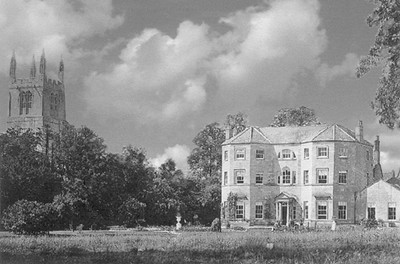
THE LORD OF THE MANOR WHO
LIKED A TIPPLE
by Rex Needle

THE LORD OF THE MANOR WHO
LIKED A TIPPLE
by Rex Needle
|
TWO FAMILIES dominated the ownership of land in the Bourne area during the
18th century, the Earl of Exeter, being Lord of the Manor of Bourne, while
George Pochin was Lord of the Manor of Bourne Abbots, although his family did
not reside in the town. George Pochin, who also had estates in Leicestershire, succeeded to the title of Lord of the Manor of Bourne Abbots from his uncle Sir Thomas Trollope in 1761. Under the Enclosure Award on 2nd January 1770, he received rather more land than the Earl of Exeter, a total of 876 acres compared with the earl's 831 acres and, like his lordship, he too had some old enclosures, in West Field and the Newlands, adjoining his new holdings while his name also appears as the owner of 36 communable houses and toftsteads. He built what was described as ďa fine mansion", the Abbey House, near the church in 1764, but after his death in 1798 ownership passed to relatives who eventually leased it to various tenants until 1849 when it became the new home of the Rev Joseph Dodsworth (1797-1877), our longest serving clergyman who administered the parish for 55 years as curate and vicar. The vicarage was previously situated at Brook Lodge in South Street but this was too small and cramped for his liking and so he arranged a property deal which traded the old vicarage and 40 acres of land in the North Field for the Abbey House, the Abbey Lawn and a small piece of land in the South Fen, a transaction that is recorded in his own hand in a spare page of the parish registers. Dodsworth remained there until his death but his successor, the Rev George Massey, disliked the house and as a result it was demolished in 1879, dismantled stone by stone and the materials used in the construction of a new vicarage, now the Cedars retirement home, although that too was phased out when the present vicarage was built in 1986. George Pochin was Lord of the Manor for 37 years and both he and his wife, Eleanor Frances Pochin, are remembered with a marble plaque on the wall of the chancel that records two lives of devotion to public service and Christian charity. There are two inscriptions, the first saying: "In memory of George Pochin Esq of this place, Colonel of the Leicestershire Regiment of Militia, Deputy Lieutenant and Magistrate in the Counties of Leicestershire and Lincolnshire. In his public capacity, he was deservedly efficient. A good soldier, faithful, upright and active magistrate of inflexible probity and unwearied attention. His benevolence and uniform integrity gained the respect and love and all who knew him. He died May 15th, 1798, aged 66 years." The second inscription says: "Sacred to the memory of Eleanor Frances Pochin, widow of the late George Pochin Esq of this place, and daughter of Sir Woolstan Dixie, Baronet, of Bosworth Park in the county of Leicestershire. Her many virtues gained her the esteem of all good men, a sincere friend, and to her servants, a kind and indulgent mistress. In her charitable distribution of an ample fortune, she appears to consider herself as the delegate of Heaven. She died on the 16th day of July, 1823, aged 76 years." When Eleanor died, the manor was left in the hands of trustees but by the late 19th century, a descendant of George Pochin, William Ann Pochin (1820-1901), also from Leicestershire, had become Lord of the Manor, retaining the title until he died. William built many properties in the locality, large and small houses that survive to this day, and his initials and the date of construction can be seen on many buildings around the district, engraved on stone plaques built into the walls and even embossed on drainage pipes. Despite his high position in Bourne society, it is also known that George Pochin liked the occasional tipple, usually a glass or two of good wine. In the grounds of the Abbey House was an Early English blank arcade, probably the south termination of the abbey cloisters, and in the absence of suitable storage facilities he hit upon the perfect solution to keep his bottles at the right temperature by making a recess in one of these compartments and fitting it with a lock and key to keep it safe were it to be discovered by others. His secret cellar remained secure for several years but one day, on going for a bottle of this wine to receive a particular friend, to his surprise he found the recess empty, every bottle having been taken away. On the robbery becoming known, the pilferers came forward and acknowledged the offence. They were workmen and while employed in effecting some repairs or alterations to the church, a brick fell from the wall. One of them put his arm into the aperture and brought forth a bottle of wine which was subsequently drunk by him and his companions and much enjoyed, coming to the conclusion that it had been placed there by the monks of the abbey a thousand years before, and having made a successful search for more, they took possession of the whole of the hidden treasure and consumed it with some pleasure. Their fate, unfortunately is unknown, but given the nature of their confession and belief in providence as to the source of their largesse, it is doubtful if any action was taken against them. George Pochin must have sought out another safe place for his wine and perhaps there are many more bottles still intact in a hidden cache within the church precincts, having remained undiscovered for more than two centuries after his death. |
NOTE: This article was published by The Local newspaper on Friday 21st May 2010.
Return to List of articles